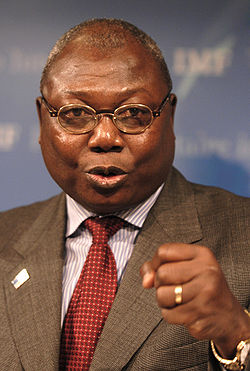
Martin Ziguélé
Encyclopedia

Central African Republic
The Central African Republic , is a landlocked country in Central Africa. It borders Chad in the north, Sudan in the north east, South Sudan in the east, the Democratic Republic of the Congo and the Republic of the Congo in the south, and Cameroon in the west. The CAR covers a land area of about ,...
politician who was Prime Minister of the Central African Republic from 2001 to 2003. He placed second in the 2005 presidential election and is currently the President of the Movement for the Liberation of the Central African People
Movement for the Liberation of the Central African People
The Movement for the Liberation of the Central African People is a political party in the Central African Republic. It was established in Paris in 1979 by former prime minister Ange-Félix Patassé as a Central African opposition movement...
(MLPC).
Ziguélé was appointed as Prime Minister on April 1, 2001 by President Ange-Félix Patassé
Ange-Félix Patassé
Ange-Félix Patassé was a Central African politician who was President of the Central African Republic from 1993 until 2003, when he was deposed by the rebel leader François Bozizé...
, replacing Anicet-Georges Dologuélé. He had previously lived in Lomé
Lomé
Lomé, with an estimated population of 737,751, is the capital and largest city of Togo. Located on the Gulf of Guinea, Lomé is the country's administrative and industrial center and its chief port. The city exports coffee, cocoa, copra, and palm kernels...
, Togo
Togo
Togo, officially the Togolese Republic , is a country in West Africa bordered by Ghana to the west, Benin to the east and Burkina Faso to the north. It extends south to the Gulf of Guinea, on which the capital Lomé is located. Togo covers an area of approximately with a population of approximately...
for twenty years and was an executive member of the MLPC. He left office when rebel leader François Bozizé
François Bozizé
François Bozizé Yangouvonda is the President of the Central African Republic. He came to power in March 2003 after leading a rebellion against President Ange-Félix Patassé and ushered in a transitional period of government...
took power upon capturing the capital, Bangui
Bangui
-Law and government:Bangui is an autonomous commune of the Central African Republic. With an area of 67 km², it is by far the smallest high-level administrative division of the CAR in area but the highest in population...
, on 15 March 2003. Ziguélé was allowed to go into exile in France.
Ziguélé was initially barred from running in the 2005 presidential election, along with six other candidates, by a court ruling on December 30, 2004. He was subsequently reinstated as a candidate by Bozizé, along with two other candidates, on January 4. Later in January, all barred candidates, with the lone exception of Patassé, were allowed to run; following this, Patassé's party, the MLPC, backed Ziguélé for the election. Previously, he had been running as an independent. The election was held on March 13, 2005, and Ziguélé came in second with 23.5% of the votes according to official results. He faced Bozizé in a second round of voting, and tried to distance himself from Patassé in campaigning, but was defeated and took 35.4% of the vote.
Ziguélé was elected as President of the MLPC on a provisional basis for one year at an extraordinary party congress in late June 2006, while Patassé was suspended from the party. On June 23, 2007, at the end of the MLPC's third ordinary congress, Ziguélé was elected to a three-year term as President.

